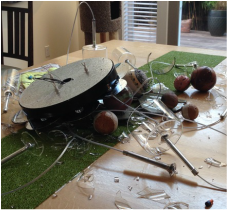
Tasks, chores, errands, jobs, to-do lists…for the past few weeks, we’ve been consumed with the day-to-day chatter of life, as we moved out of our apartment and into our remodeled house, welcomed our new puppy, and helped our son Chris and girlfriend Candace transition from Olympia and into our guest room (temporarily) as they relocate to Seattle.
And, of course, looming above everything, we’ve been coping with Mark’s cancer and the side-effects of the new chemotherapy treatment.
This clinical trial regimen isn’t as bruising as the first course of treatment, but it still presents many challenges: Mark has no appetite, and experiences intestinal distress in its many forms. He is almost always tired and usually cold. He will have a CAT scan on April 30, and we meet with Dr. C on May 7 to review the results to see if the tumors are shrinking. Mark lost all his hair during the first course of treatment; now, it’s growing back. The accumulation of fluids in Mark’s abdomen has slowed, which is a good sign. He’s planning to fly to California soon to play in a golf tournament with good friends, which was unthinkable a few months ago.
And we have reached a milestone: It’s been six months since Mark’s diagnosis. The first cancer doctor we saw posited that Mark most likely had maybe six months to live. We never went back to that doctor…and Mark is doing better now than he was at the beginning of this journey.
In these past frenzied days, I have occasionally even forgotten for a little while that Mark has cancer, as other daily demands sucked up resident space in my brain. When that’s happened, it’s always been followed by a bit of a shock when I look at Mark and realize, oh yes, that’s right, he’s really, really sick. I don’t know if these fragments of respite are blessings or curses. It’s a luxury to feel, for small moments in time, that my life is “normal,” but those brief periods are always followed by a stab of guilt. My husband is fighting a deadly and ruthless cancer, and I forgot about it? I know, and no one has to tell me, that this guilt is irrational. It doesn’t matter. We don’t live in the land of rational thought.
My life has changed forever because of this path, no matter what the ultimate outcome may be. Caregiving scrapes you raw, and something different grows back over the rawness. You can’t witness the suffering and erosion of someone you love and come out unscathed. Now, I am so much more aware of the looming end of life. Death is always lurking somewhere ahead for all of us, but I’ve spent most of my life ignoring it. Not any more.
My priorities have shifted too. As part of our remodel, we ordered a very lovely Italian glass light fixture for over our dining room table. We had to wait weeks for it, and after it arrived, our contractor and an electrician struggled for about three hours to space and assemble the individual glass pieces into a complex cascade. It was spectacular. Two days later, in the middle of the night, we heard a momentous crash, almost an explosion. The electrician hadn’t anchored the fixture properly, and it fell, like a The Phantom of the Opera prop, wrenching itself out of the ceiling and tearing into the dining room table, shattering and scattering glass around the room.
The pre-cancer me might have fallen into a nasty gloom at this turn of events. But the post-cancer me mentally shrugged and thought, it’s just a thing, and things break. A ceiling and a table can be fixed, and a light fixture can be replaced. On the river of life, this doesn’t even count as a tiny ripple.
And there have been unexpected gifts. Our son has been an adult for some years now, but in the way of all mothers, I have a tendency to see him as the child he once was. Now I see the grownup, as he takes care of his father in careful, loving, thoughtful ways that make me proud.
What comes next? We will await the results of this course of treatment. I’ve been reading and studying anything and everything about cancer that comes along. New treatments based on activating a patient’s own immune system—immunotherapy—are producing very promising results for some cancers, but these treatments are all in the clinical trial stage. We can’t really plan ahead right now. We have to be prepared to act and react, to advances and setbacks and opportunities, as we continue down this road.
 RSS Feed
RSS Feed
